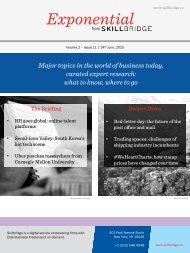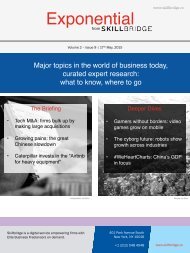Exponential - 26 July, 2015
In this issue: How organic food is taking over America, China's surging investment in developing economies and the latest pharma products to hit the market and your regular "need to knows" - the world in brief, five must reads and we heart charts.
In this issue: How organic food is taking over America, China's surging investment in developing economies and the latest pharma products to hit the market and your regular "need to knows" - the world in brief, five must reads and we heart charts.
Create successful ePaper yourself
Turn your PDF publications into a flip-book with our unique Google optimized e-Paper software.
<strong>Exponential</strong><br />
Synthesizing the best of the business & strategy press<br />
In this issue:<br />
• Room to grow: organic food takes over<br />
America<br />
<strong>26</strong> <strong>July</strong>, <strong>2015</strong> | New York, NY<br />
• On the red carpet: China invests in<br />
developing economies<br />
Skillbridge is a digital service<br />
empowering firms with Elite<br />
Business Freelancers on demand.<br />
www.skillbridge.co<br />
• Drug wars: new pharma products hit the<br />
market<br />
• Meet Stijn Paumen, a man on a $25m<br />
mission to make mobile internet safer<br />
1 +1 (212) 548 4548 www.skillbridge.co
<strong>Exponential</strong> the Skillbridge Magazine<br />
The Briefing<br />
The global round-up<br />
J. Crew to open lower-priced stores<br />
J. Crew Group plans to open its first J.<br />
Crew Mercantile chain for budgetconscious<br />
shoppers in Texas. The new<br />
store format will feature merchandise<br />
with prices closer to what shoppers would<br />
find at its outlet stores. The privately held<br />
company has had trouble with falling<br />
shopper traffic, writing down the value of<br />
its brick-and-mortar operations by more<br />
than $500 million late last year.<br />
Mexico auctions off its oil; falls short<br />
waklingsf via<br />
flickr<br />
The Mexican government’s attempt to<br />
open its oil and gas industry to private and<br />
foreign investment for the first time in<br />
almost 80 years has fallen short. Only two<br />
successful bids were made out of 14<br />
blocks tendered. The energy overhaul is<br />
the flagship economic reform of President<br />
Enrique Peña Nieto. Nine companies<br />
participated in the auction. Many blocks<br />
received no offers, and others had bids<br />
below the minimum required for profitsharing<br />
with the government. Two blocks<br />
were won by Mexican firm Sierra Oil &<br />
Gas, in a consortium with Houston-based<br />
Talos Energy and the UK’s Premier Oil.<br />
2 +1 (212) 548 4548 www.skillbridge.co
<strong>Exponential</strong> the Skillbridge Magazine<br />
UK life sciences funding at 10-year high<br />
In an echo of the US biotech boom, UK life<br />
sciences funding is at a ten-year high.<br />
According to the FT, money raised through<br />
stock market flotations “rose more than<br />
eightfold in 2014 to £408m — accounting for<br />
more than 40 per cent of the total raised in<br />
this way by UK biotech companies in the past<br />
10 years.” Venture capital funding rose 71%<br />
from the year before to a high of $430m,<br />
according to the UK Bioindustry Association.<br />
New car sales surprisingly drop in China<br />
The world’s largest auto market has<br />
slipped: China’s new car sales registered a<br />
rare decline. The China Association of<br />
Automobile Manufacturers said that<br />
passenger-car sales in June fell by 3.4%<br />
compared to a year earlier. This is the<br />
third monthly decline since September<br />
2012. The past two monthly blips were<br />
linked to a weeklong holiday in 2013 and<br />
other political events. The only reason to<br />
explain last month’s decline is that the<br />
economy is slowing. China’s first-quarter<br />
economic growth came in at 7%, its<br />
slowest pace in decades.<br />
Kenyan telecom competition heating up<br />
Over the past two decades, Safaricom has<br />
built the world’s most widely used mobilemoney<br />
network in Kenya. Any Kenyan can<br />
send funds to almost anyone else<br />
instantaneously from a mobile phone.<br />
Transactions are valued at 40% of GDP. Now<br />
Safaricom faces a new competitor: Equity<br />
Bank has revolutionized Kenyan local<br />
finance by slashing fees and helping to<br />
increase access to the banking sector. Equity<br />
has acquired a license to operate a mobilephone<br />
service in conjunction with Airtel and<br />
launched the service on <strong>July</strong> 15. It aims to<br />
have 5 million customers by the end of <strong>2015</strong>.<br />
3 +1 (212) 548 4548 www.skillbridge.co
The Briefing<br />
The Briefing<br />
<strong>Exponential</strong> the Skillbridge Magazine<br />
Five key reads<br />
aiigle_dore via flickr<br />
HBR: Just Hearing Your Phone Buzz Hurts Your Productivity<br />
DISTRACTIONS; TECHNOLOGY – New research discussed in the Harvard<br />
Business Review - “The Attentional Cost of Receiving a Cell Phone Notification” -<br />
reports that the “reverberations of new notifications can distract us, even when<br />
we don’t look over to see what they could be.” The authors, Cary Stothart, Ainsley<br />
Mitchum, and Courtney Yehnert of Florida State University showed that just<br />
being aware of an alert can hurt people’s performance on an attention-demanding<br />
task. If you hope to stave off distraction and perform tasks at your very best, the<br />
researchers suggest not only putting your phone on silent, but also hiding it so<br />
that you can’t hear, feel, or see any incoming notifications.<br />
Bloomberg: This Is How Uber Takes Over a City<br />
TECHNOLOGY; GOVERNMENT – Bloomberg’s piece offers a minute-byminute<br />
account of how Uber gained a presence in Portland, Oregon and how it<br />
enters other regions. Uber’s ground war costs are expensive particularly in the<br />
money spent on lobbyists. In Texas in 2013, Uber had no registered lobbyists in<br />
the state. In 2014, it reported 14 lobbyists, and so far in <strong>2015</strong>, that’s grown to 28.<br />
The total cost of these contracts could total from $420,000 to $945,000 according<br />
to filings. In the past year, Uber spent $208,000 in Maryland and $684,000 in<br />
California on lobbying costs. Arguably, this money is well spent: the firm’s overall<br />
valuation has grown to over $50bn in <strong>2015</strong>.<br />
4 +1 (212) 548 4548 www.skillbridge.co
The Briefing<br />
Five Key Reads<br />
<strong>Exponential</strong> the Skillbridge Magazine<br />
Economist: In it for the long haul<br />
ISRAEL; AIRLINES – Israel signed an open-skies treaty with Europe in<br />
2013 with the aim of removing all bilateral air traffic restrictions by 2018.<br />
With the new deal taking force, Ryanair recently announced that it will<br />
fly to Eilat in southern Israel in November—its first ever Middle Eastern<br />
connection — from three points in eastern Europe. For passengers, cheap<br />
travel to Israel is already an option: EasyJet currently flies to Tel Aviv<br />
from nine points in Western Europe. Hungarian carrier Wizz Air links<br />
the same city with another eight destinations in Eastern Europe. The<br />
trend has caused problems for El Al, Israel’s national flag carrier, which is<br />
not a low-cost carrier.<br />
Quartz: The world eats cheap bacon at the expense of North Carolina’s<br />
rural poor<br />
FOOD; MANUFACTURING; SOCIETY – Pork has long been important<br />
to North Carolina’s economy: in the early 1700s it was used as legal<br />
tender by locals. Since the late 1990s, Duplin County, North Carolina, has<br />
been the top hog producing county in the country. The county is home to<br />
530 hog operations with capacity for over 2 million pigs. Pigs outnumber<br />
humans almost 32 to 1 in the town. The impressive production figures<br />
come with high costs to the human residents. Lagoons of noxious waste<br />
pose a series of problems for the citizens of Duplin County.<br />
Men’s Journal: The Death of Golf<br />
GOLF; SPORTS – Since Tiger Woods dominated golf in the early 2000s,<br />
the sport rapidly declined in America. Participation in golf decreased<br />
from a high of 30.6 million golfers in 2003 to 24.7 million in 2014,<br />
according to the National Golf Foundation. Long-term trends are also<br />
troubling: the number of golfers aged 18 to 34 shows a 30% decline over<br />
the last 20 years. Nearly every metric — TV ratings, rounds played, golfequipment<br />
sales, golf courses constructed — shows a drop-off. Various<br />
attempts to "save" golf by making the game faster, cheaper, and easier to<br />
play have taken on an air of desperation. Golf continues to face challenges<br />
because of Millennials’ lack of interest in the sport and their difficulties<br />
in maintaining attention over a five-hour round. That’s not to mention<br />
the cost which can be up to $150 to play 18 holes, even at a public course.<br />
5 +1 (212) 548 4548 www.skillbridge.co
Winners and Losers<br />
Good Week For: Chinese ride-hailing startup Didi Kuaidi<br />
Chinese ride-hailing startup Didi Kuaidi raised $2 billion, the largest<br />
ever fundraising for a Chinese tech startup. The funding round values<br />
the firm at $15 billion. Didi Kuaidi is Uber’s biggest rival in China.<br />
Bad Week For: US Airlines<br />
Flyers are suing America’s four largest carriers - Delta, American,<br />
United and Southwest - alleging that they have colluded to keep<br />
ticket prices high. The Wall Street Journal explains that the US<br />
airline industry is enjoying some of its strongest profits ever, “after<br />
years of consolidation and the past year’s plunge in the price of fuel.”<br />
According to the US government, American carriers earned nearly<br />
$25 billion since the start of 2013. This followed a $33 billion loss in<br />
the previous decade.<br />
Good Week For: Airbus<br />
Airbus has completed its first electric plane flight across the English<br />
Channel. The two-seater E-Fan demonstrator plane is powered<br />
exclusively by lithium batteries. The flight took 36 minutes to fly<br />
from the town of Lydd in southern England to Calais, France.<br />
Electric flight may significantly reduce carbon emissions created by<br />
traditional airplanes.<br />
Bad Week For: Indian outsourcing firms<br />
Drug-maker AstraZeneca is scaling back the business it gives to<br />
Indian outsourcing companies. Over the next two years, AstraZeneca<br />
will cut in half its $750 million annual outsourcing budget. The<br />
number of people working on IT at the firm will also drop by 50%. The<br />
cuts come as a shift toward cloud computing is replacing many of the<br />
workers AstraZeneca has previously used. Outsourcing accounts for<br />
around 20% of all of India's exports..<br />
6 +1 (212) 548 4548 www.skillbridge.co
<strong>Exponential</strong> the Skillbridge Magazine<br />
Feature<br />
We built this city:<br />
Lego to create<br />
sustainable bricks<br />
Innovation at the Danish brickmaker<br />
Danish toy-maker Lego has decided to give its world-famous<br />
bricks their first makeover since 1963. Lego executives have<br />
teamed up with outside scientists to look for a bio-based<br />
alternative to the petroleum-based plastic that is used to make<br />
its bricks.<br />
The company is trying to reduce its carbon footprint. But the<br />
changes won’t happen overnight: the process is unlikely to be<br />
completed until 2030 with the goal of making the bricks<br />
indistinguishable from the units used today. The firm earned a<br />
15% increase in profit in 2014, raking in just over $1 billion with<br />
a 25% operating profit margin.<br />
7 +1 (212) 548 4548 www.skillbridge.co
<strong>Exponential</strong> the Skillbridge Magazine<br />
Feature<br />
Room to grow:<br />
organic food takes<br />
over<br />
• 45% of Americans actively try to include organic foods in their diets.<br />
• The USDA says sales of organic food products reached $35bn in 2014.<br />
The organic food revolution<br />
While naturally grown food represents a small portion of overall<br />
agricultural production, organic brands are booming. The Wall<br />
Street Journal reports that “farmers who grow and process<br />
organics have been reporting big increases in demand and<br />
sales.” Gallup reports that 45% of Americans actively try to<br />
include organic foods in their diets. According to the USDA,<br />
sales of related food products reached $35 billion in 2014, with<br />
fresh fruits and vegetables remaining the top selling category.<br />
8 +1 (212) 548 4548 www.skillbridge.co
<strong>Exponential</strong> the Skillbridge Magazine<br />
Can Big Food compete against organic suppliers?<br />
The WSJ reports that food giants like Kellogg and Kraft are facing a<br />
dramatic shift in the way Americans eat as consumers demand<br />
fresher and healthier products. Consumers are increasingly sceptical<br />
of large brands and have taken to purchasing foods from smaller and<br />
naturally-focused firms.<br />
Over the past five years, the top five food and beverage companies<br />
reported aggregate sales increases of 1.4%. This figure can be<br />
compared with more rapid growth in the organic sector. A survey<br />
from the Organic Trade Association found organic food sales were up<br />
11% in 2014 over 2013. Most buying is happening within<br />
conventional outlets: 78% of organic shoppers purchased food at<br />
supermarkets, not at farmers’ markets.<br />
The Organic Trade<br />
Association found that<br />
organic food sales are up<br />
11% in 2014 over 2013.<br />
Organic yields look stronger<br />
The yields that organic crops produce have long been a contentious<br />
issue. According to scientists at the University of California,<br />
Berkeley, “when the same products are grown, organic yields are 8%<br />
to 19% lower on average than conventional-farming yields, depending<br />
on the cropping system.” The researchers noted, however, that the<br />
available studies comparing farming methods were frequently biased<br />
in favor of conventional agriculture so the estimate of the yield gap is<br />
likely overestimated. Furthermore, two agricultural practices, multicropping<br />
(growing several crops together on the same field) and crop<br />
rotation, would substantially reduce the yield gap to 9% and 8%<br />
respectively.<br />
What the brains think…<br />
The HBR piece “Making Sustainability Profitable” argues that it is<br />
hard for companies “to recognize that sustainable production can be<br />
less expensive.” This is, in part, because companies must change the<br />
way they think about lowering costs. Initial investments in costly<br />
materials and methods can lead to greater savings down the road. A<br />
new approach is required in which firms buck conventional financial<br />
wisdom. Instead of focusing on reducing unit costs, firms should<br />
concentrate “on increasing the efficiency of the system as a whole.”<br />
Keeping employees aligned with sustainability goals can be<br />
challenging. HBR suggest that one option would be to tie the<br />
compensation of senior executives to environmental and social<br />
efforts as well as financial results.<br />
Berkeley scientists report<br />
when the same products<br />
are grown, organic yields<br />
are 8% to 19% lower on<br />
average than<br />
conventional farming<br />
yields<br />
Key Reading:<br />
• WSJ: How Can Big<br />
Food Compete Against<br />
Fresher Rivals?<br />
• Berkeley News: Can<br />
organic crops compete<br />
with industrial<br />
agriculture?<br />
• HBR: Making<br />
Sustainability<br />
Profitable<br />
9 +1 (212) 548 4548 www.skillbridge.co
<strong>Exponential</strong> the Skillbridge Magazine<br />
Feature<br />
On the red carpet: China<br />
keeps investing in the<br />
developing world<br />
• China’s investments abroad amounted to $870bn at the end of last year.<br />
• China has 20% of the world’s population yet only 7% of its arable land.<br />
China invests for its future in the developing world<br />
With 20% of the world’s population but only 7% of its arable<br />
land, China is forced to import much of its food. China views<br />
Africa and Latin America as necessary sources of much-needed<br />
agricultural products and natural resources. With imports<br />
growing to unprecedented levels, China has been investing<br />
heavily in infrastructure across the developing world. The<br />
Heritage Foundation reports that China’s investments abroad<br />
amounted to $870 billion in 2014, compared to America’s $368<br />
billion in 2013.<br />
10 +1 (212) 548 4548 www.skillbridge.co
<strong>Exponential</strong> the Skillbridge Magazine<br />
The Chinese continue to invest in Africa<br />
According to a Pew Research Center survey, nowhere is public<br />
opinion towards China higher than in Africa - favourable ratings<br />
stand at 70%. Since 2009, China has been Africa’s biggest trading<br />
partner. In 2013, trade between China and Africa totalled $200<br />
billion. More than 1 million Chinese citizens, primarily laborers and<br />
traders, have moved to the continent in the past 10 years. China’s first<br />
lucrative African investments were in Angola in 2004, when Chinese<br />
road investments were exchanged for a share of Angola's vast oil<br />
reserves. Chinese investment in African countries has risen thirty<br />
fold in the past ten years: foreign direct investment went from $500<br />
million in 2003 to almost $15 billion in 2012.<br />
In 2014, China pledged<br />
investments of $20bn in<br />
African infrastructure.<br />
China is the new “Good Neighbor”<br />
Over the next 10 years, the Chinese government is projected to invest<br />
$250 billion in Latin America and the Caribbean. Within a decade,<br />
Chinese president Xi Jinping estimates that bilateral trade between<br />
China and Latin America could reach $500 billion per year. Recent<br />
developments include China and Venezuela agreeing to $20 billion of<br />
joint projects and a $7.5 billion loan from China to Ecuador.<br />
The tie-up with Ecuador points to the growing dependence felt by<br />
developing economies on their new partner. Since 2009, China has<br />
loaned the South American nation $10 billion; it holds 30% of<br />
Ecuadorean external debt and takes half of its oil exports. Beijing’s<br />
broader bet on Latin America’s rich natural resources is also<br />
accompanied by substantial investments n telecoms and banking.<br />
What the brains think…<br />
The PWC article - “Separating fact from fiction in the China-Africa<br />
relationship” – points to the fact that, over the past 15 years, much of<br />
Africa has had uninterrupted growth. PWC asserts that “Chinese<br />
investors are particularly well positioned to take advantage of the<br />
improved economic environment in Africa.” Part of the reason stems<br />
from the fact that many Chinese firms in Africa are large state-owned<br />
enterprises. Though these firms are not always the most efficient,<br />
they have a competitive edge: they can utilize subsidized credit from<br />
their home government which enables them to out-compete other<br />
bidders for African procurement contracts. As the Chinese economy<br />
has started to slow down, it is unclear whether the Beijing<br />
government will continue to make investments on such a grandiose<br />
scale.<br />
China and Venezuela<br />
agreed to $20 billion in<br />
joint projects.<br />
Key Reading:<br />
• US News & World<br />
Report: China Is<br />
Besting the U.S. in<br />
Africa<br />
• The Economist: One<br />
among many<br />
• PwC: Separating fact<br />
from fiction in the<br />
China-Africa<br />
relationship<br />
11 +1 (212) 548 4548 www.skillbridge.co
<strong>Exponential</strong> the Skillbridge Magazine<br />
Feature<br />
Drug wars: new<br />
pharma products<br />
hit the market<br />
• Entresto, a heart disease treatment from Novartis, which cut death rates by<br />
20% in clinical trials, was approved by US regulators.<br />
• Analysts expect Entresto to reach $6bn in annual sales.<br />
Big Pharma’s got a future<br />
Blockbuster drugs are back. A new wave of multibillion-dollar<br />
medicines for heart disease, high cholesterol, cancer and<br />
hepatitis C are about to hit the market, reviving optimism in the<br />
pharmaceuticals industry. In a major development, the<br />
Financial Times reports that Entresto, a heart disease<br />
treatment from Novartis has been approved by US regulators.<br />
Analysts expect that the drug, which cut death rates by 20% in<br />
clinical trials, could reach $6 billion in annual sales.<br />
12 +1 (212) 548 4548 www.skillbridge.co
<strong>Exponential</strong> the Skillbridge Magazine<br />
More problems; more money<br />
The pharmaceuticals industry is on the up. S&P’s pharmaceuticals<br />
index has risen by almost 25% in the past year. According to research<br />
firm Citeline, a record 61 drugs were introduced around the world<br />
last year compared with an annual average of 34 in the last decade.<br />
The pick of the new treatments include a new category of cancer<br />
drugs that utilize the human immune system to destroy tumors, A<br />
large player in this developing immunotherapy market is Merck and<br />
Bristol-Myers Squibb. The firm has developed treatments which are<br />
set to generate $35 billion of annual sales within a decade.<br />
S&P’s pharmaceuticals<br />
index has risen by almost<br />
25% in the past year.<br />
M&A at generic drug makers<br />
86% of pharmaceutical sales in America are made up of generic<br />
drugs, accounting for 45% of the global market. A proposed merger<br />
between America’s two largest generic drug makers faces sharp<br />
criticism from the Consumers Union and seven other pro-consumer<br />
groups who have asked antitrust enforcers to block Teva<br />
Pharmaceutical Industries’ proposal to purchase Mylan NV. The<br />
Consumers Union claims that the merger would lead to higher prices<br />
and more drug shortages. To date, a deal does not appear to be<br />
imminent. Mylan has continuously rebuffed Teva's takeover bids,<br />
including a $40 billion move in April <strong>2015</strong>. If the Teva-Mylan merger<br />
happens, the two companies would make 25% all generic drugs.<br />
More than 50% of retail<br />
generic drugs saw their<br />
prices rise between <strong>July</strong><br />
2013 and <strong>July</strong> 2014.<br />
What the brains think…<br />
The McKinsey piece “Pharma’s first-to-market advantage” highlights<br />
the long-running debate about the “value of being first to market,”<br />
noting that companies spend significant resources to increase their<br />
odds of being first off the block. In the race to market a new drug<br />
class, companies believe that every month of lead time is significant.<br />
McKinsey’s analysis shows that the advantage is more complex and<br />
nuanced than it might appear. The report points to the fact that, on<br />
average, first-to-market advantage is weak and “dependent on market<br />
context.” Frequently, first-mover advantage vanishes especially when<br />
the lead time is short or when the first mover is a small company. The<br />
article concludes that first-mover advantage is “more pronounced in<br />
specialty areas with small numbers of prescribers and patients.”<br />
Key Reading:<br />
• FT: Drugmakers<br />
premiere summer<br />
blockbusters<br />
• Reuters: U.S. consumer<br />
groups oppose Teva bid<br />
for generic drug rival<br />
Mylan<br />
• McKinsey: Pharma’s<br />
first-to-market<br />
advantage<br />
13 +1 (212) 548 4548 www.skillbridge.co
<strong>Exponential</strong> the Skillbridge Magazine<br />
h<br />
The Interview<br />
• This week’s interview is with Stijn Paumen, who leads<br />
business development at Wandera, a London and San<br />
Francisco based company. He talks to us about<br />
working trans-atlantic, the mobile security challenge<br />
and the difference his MBA has made.<br />
• Wandera are leaders in the emergent enterprise<br />
mobile security market. It was founded by the team<br />
behind ScanSafe (acquired by Cisco) a web security<br />
vendor, three years ago. To date they’ve raised $25m<br />
from 83North and Bessemer Venture Partners.<br />
What does Wandera do?<br />
We deliver a Cloud platform to<br />
enterprises which enables them to<br />
manage and secure mobile data<br />
usage on IOS and Android devices.<br />
We started in 2012 and now have<br />
about 60 employees. We’re<br />
privately held and have raised<br />
$25m so far from investors such as<br />
Bessemer.<br />
What are the main problems<br />
that you’re trying to solve at<br />
Wandera?<br />
In recent times, a lot of firms have<br />
migrated away from Blackberry to<br />
iPhones. These devices are more<br />
consumer-friendly than<br />
enterprise-friendly. These days, the<br />
average iPhone user consumes<br />
around 3GB a month: how does an<br />
organization manage the impact on<br />
their costs? More importantly<br />
these devices have brought with<br />
them a range of security threats<br />
that companies don't yet have a<br />
good handle on. Every corporate<br />
laptop in the world has some kind<br />
of anti-virus or web security type<br />
software on it; mobile devices do<br />
not have the same level of<br />
protection.<br />
What are your key strategies<br />
for dealing with these<br />
problems?<br />
Our approach is known as multilevel<br />
security. We have an app on<br />
mobile devices which can identify<br />
security threats and scan the device<br />
locally but, in addition, we've got a<br />
Cloud service that sits between the<br />
mobile device and the internet.<br />
This gives you two data points<br />
which you can correlate to identify<br />
threats and deliver better security<br />
in real time.<br />
14 +1 (212) 548 4548 www.skillbridge.co
<strong>Exponential</strong> the Skillbridge Magazine<br />
The Interview<br />
h<br />
What do you see as the major<br />
emerging issues in your sector?<br />
I think security is a huge area and a disaster<br />
waiting to happen. Apps on iPhones and<br />
Android devices focus on user experience.<br />
Users will click on any message that's<br />
prompted on their screen in order to continue<br />
to the network. There's a huge amount of<br />
vulnerability associated with that type of<br />
behavior.<br />
For example, a hacker can buy a device on<br />
Amazon called a Pineapple WiFi. Most<br />
handheld devices are set up to connect<br />
automatically to networks. A “Pineapple”<br />
essentially spoofs the network and forces the<br />
mobile to connect to it. At that point, hackers<br />
can access your e-mails and passwords. We’ve<br />
even seen hackers injecting pages to prompt<br />
the user to enter information. For example, an<br />
Apple pay page might prompt the user to input<br />
their credit card details. We haven’t had a<br />
Sony-style network exploitation yet but<br />
hackers are really focusing on mobile devices<br />
these days.<br />
You have an interesting education<br />
trajectory including an MBA from<br />
INSEAD? How did this give you a base<br />
for your current work?<br />
An MBA helps you to build a strong network<br />
and provide a broader horizon. A trend for a lot<br />
of MBAs these days is not necessarily to go<br />
into finance or consulting but to move into<br />
tech. Having friends who you can share your<br />
experiences with makes a huge difference.<br />
You’ve worked in the UK and America,<br />
what do you think are the most<br />
interesting differences?<br />
Hiring is a very different beast in the UK. In<br />
the US, there is much more focus on equity. At<br />
an interview, every salesperson will ask about<br />
what options they can get. In the UK, sales<br />
reps and even developers don’t really<br />
understand the upside of options and care<br />
more about the overall package and the base<br />
salary. Another obvious point to bear in mind<br />
is that Europe is a much more fragmented<br />
market than the US. In the US, for example, we<br />
work with AT&T. To get a similar market<br />
penetration in Europe, you would need to sign<br />
multiple operators like Vodafone, Deutsche<br />
Telecom and BT.<br />
Do you have any funny anecdotes to<br />
share about being a European working<br />
in America?<br />
As Europeans, we’re not really used to the<br />
concept of car pool lanes. Commuting down<br />
from San Francisco to Mountain View, my<br />
colleague would often find himself in the solo<br />
lane, sitting in traffic. He came up with a<br />
solution which was to buy a scarecrow and put<br />
it in the passenger seat. After that, most of his<br />
journeys were a lot quicker!<br />
Stijn Paumen is VP of Business Development at Wandera,<br />
Inc. based in London, England. Prior to Wandera, he was a<br />
Director of Business Development at Scansafe & Cisco.<br />
His career started at Silicon Valley chronicle, Red Herring.<br />
He holds an MSc from Oxford University and an<br />
MBA from INSEAD.<br />
15 +1 (212) 548 4548 www.skillbridge.co
<strong>Exponential</strong> the Skillbridge Magazine<br />
Deeper Dives<br />
We heart h charts<br />
Trane de Vore via flickr<br />
Has the US government increased<br />
spending on organic agriculture?<br />
Mandatory spending on organic agriculture, 2002-2014 Farm Acts<br />
The 2014 Farm Act allocates more<br />
money to organic agriculture than ever<br />
before. The US organic food market is<br />
estimated to be worth $45bn in <strong>2015</strong>.<br />
Investments in the agriculture sector<br />
are driven by cost-effectiveness and<br />
consumer demand.<br />
Source: SeekingAlpha<br />
Chinese lending to Latin America<br />
Where has China made the most<br />
investments in Latin America?<br />
China’s investments in oil-rich<br />
Venezuela are by far its largest in South<br />
America. From Mexico to Jamaica,<br />
China is spreading its economic<br />
strength around the continent.<br />
Source: Inter-American Dialogue<br />
What percentage of prescription drug<br />
sales in the US are for generic drugs?<br />
Generic versions of a drug can cost<br />
between 30% and 80% less than the cost<br />
of the original drug. Today, generics<br />
make up approximately 86% of<br />
prescription drug sales in the United<br />
States. According to a BCC Research<br />
report, the global generic drug market is<br />
now valued at around $300 billion.<br />
Generic Share of Prescriptions Filled 1984-2013<br />
Source: Pharma.org<br />
16 +1 (212) 548 4548 www.skillbridge.co











